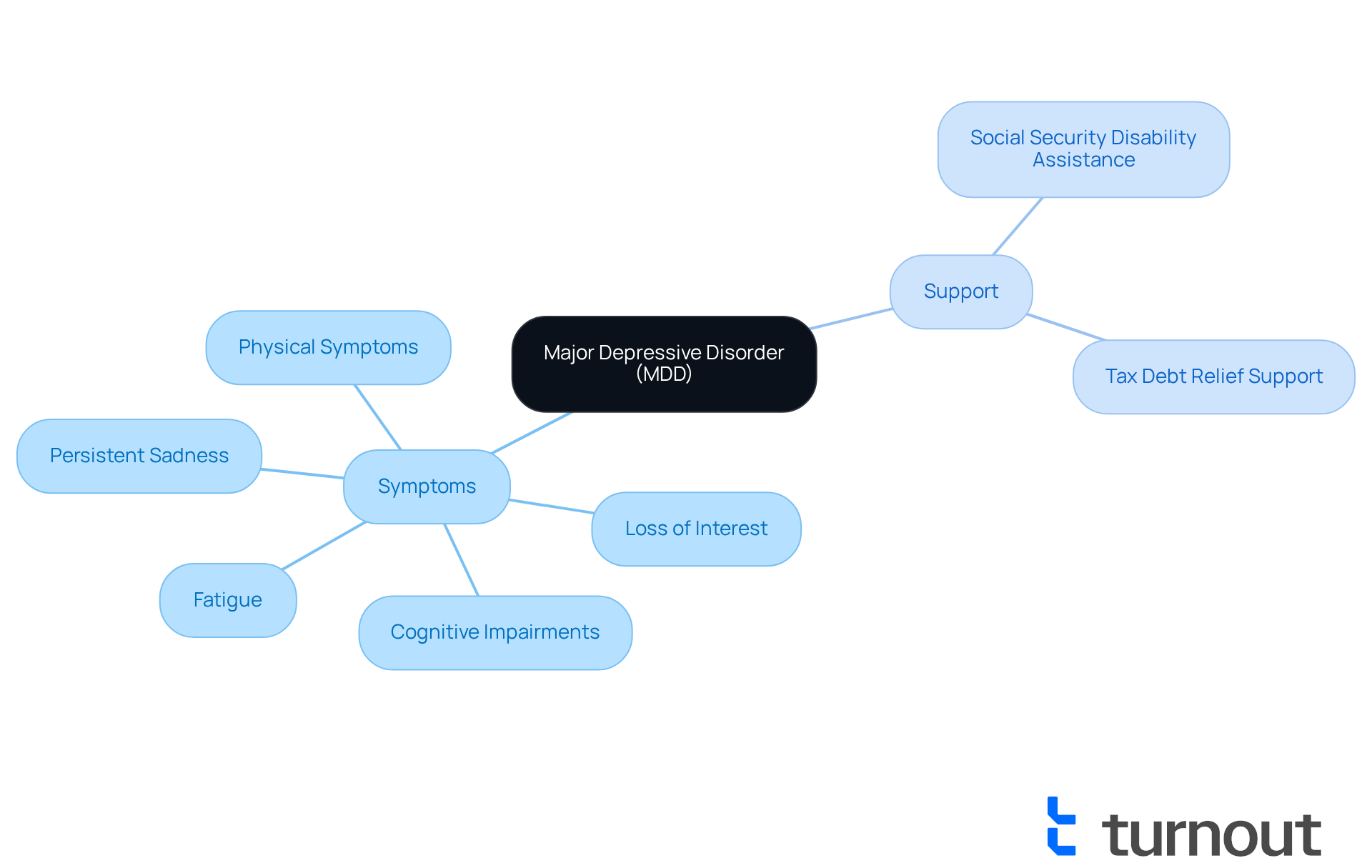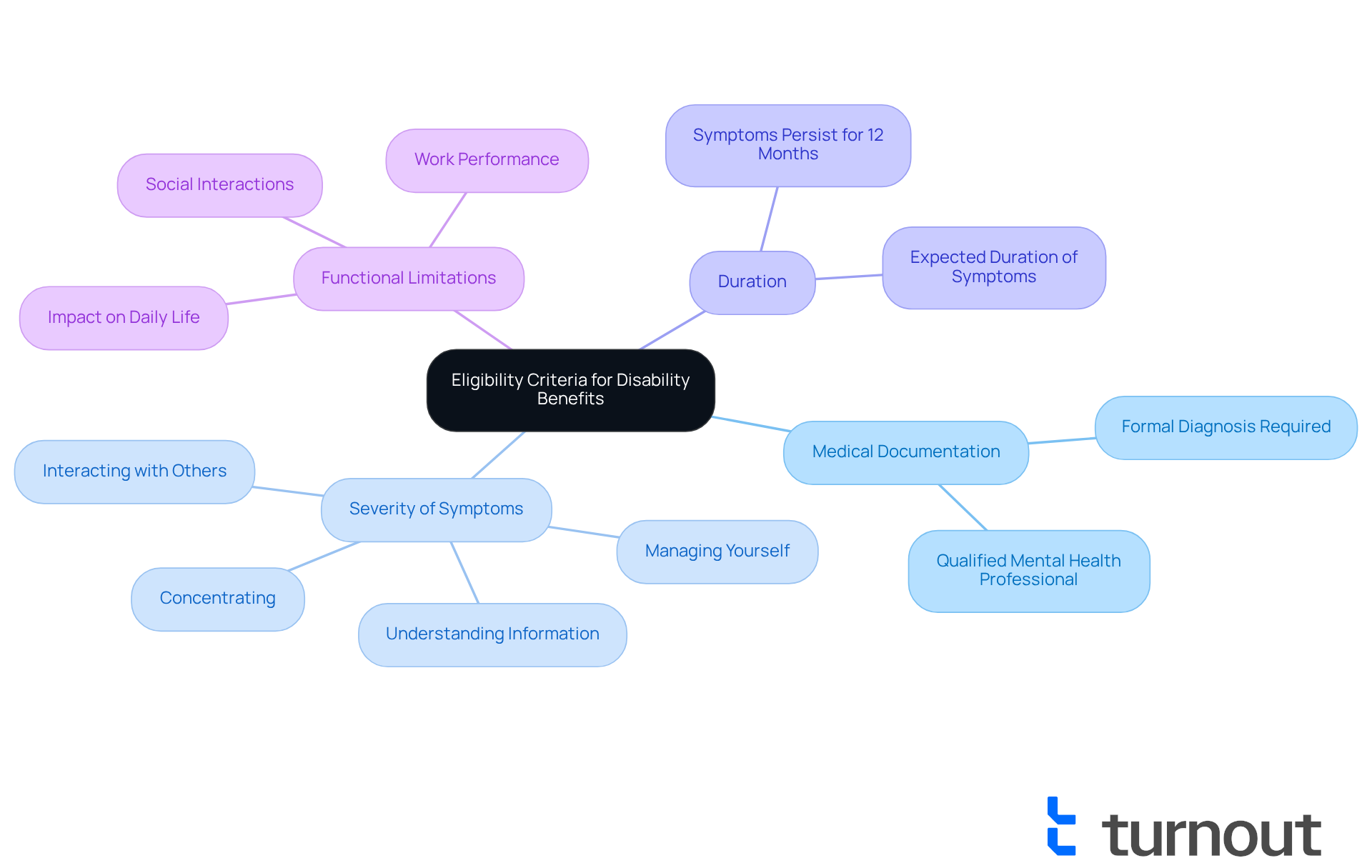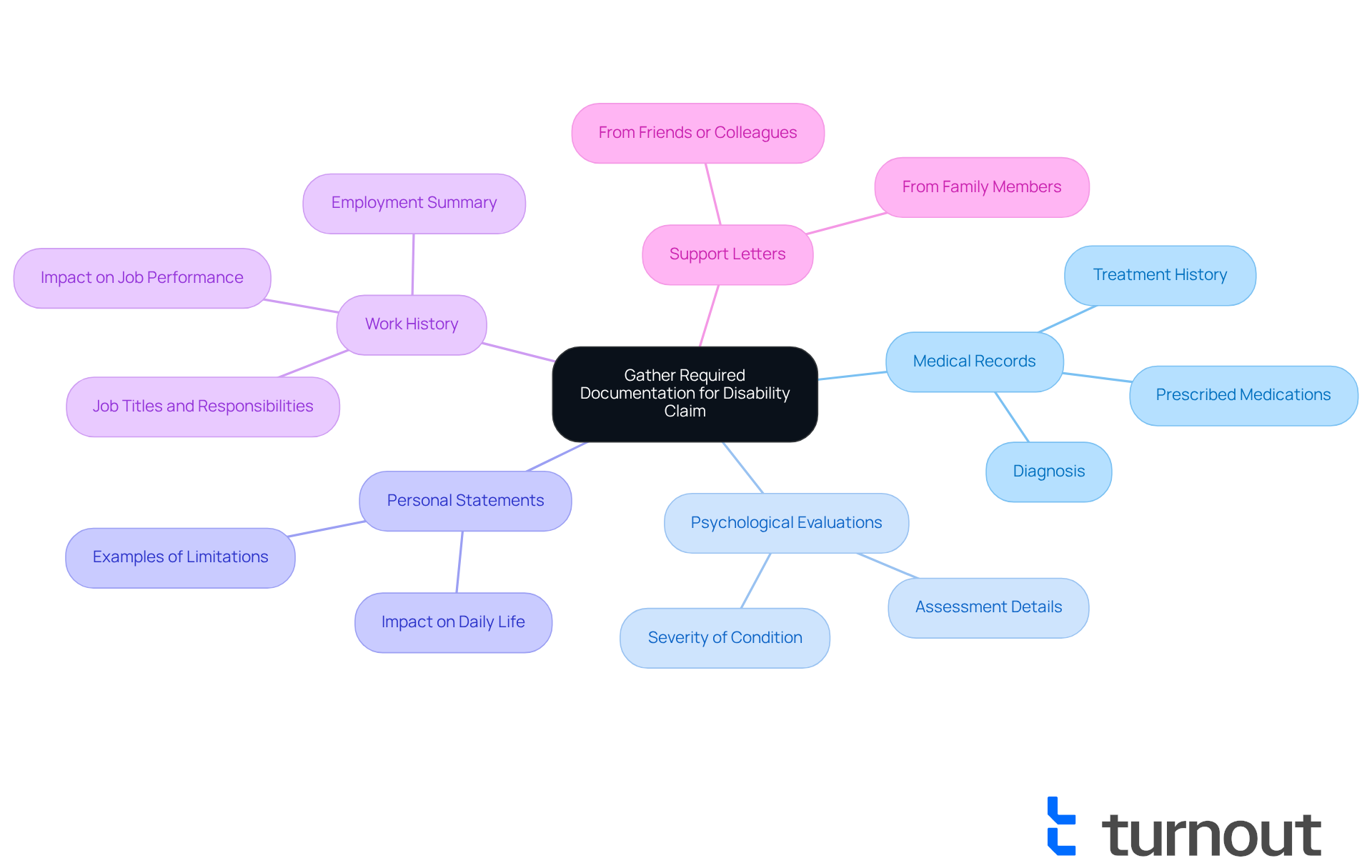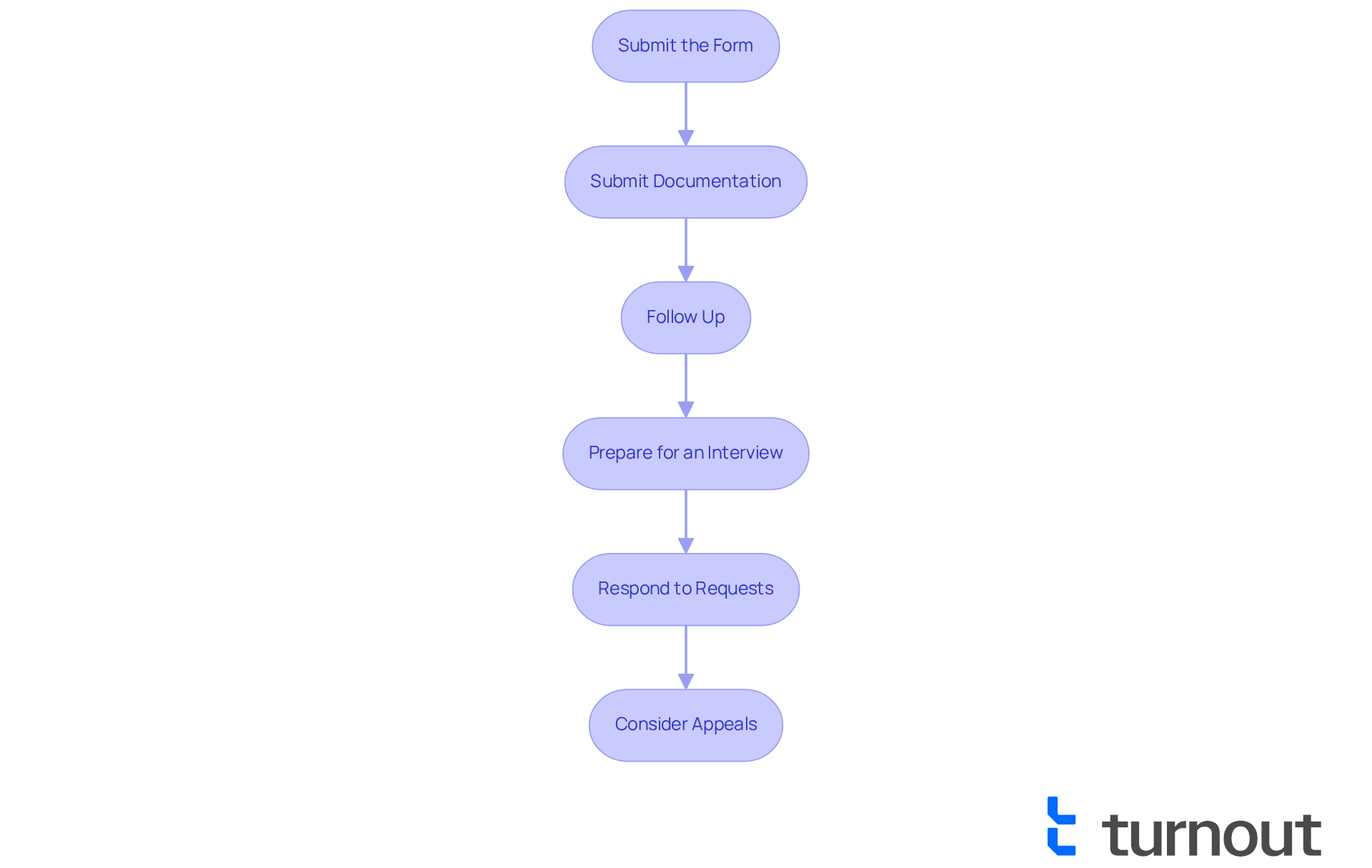Overview
Navigating major depression as a disability can feel overwhelming, and it's important to understand both the symptoms and the eligibility criteria for Social Security Disability (SSD) benefits. We understand that this journey can be challenging, but you are not alone in seeking assistance.
To qualify for SSD benefits, individuals must provide medical documentation of their condition. This documentation is crucial in demonstrating how major depression severely limits daily functioning. Gathering the necessary evidence can seem daunting, but there are trained advocates available to guide you through the application process.
It's common to feel uncertain about where to start. Remember, taking the first step is vital. By reaching out for help and understanding the requirements, you can navigate this process more smoothly. We're here to help you every step of the way.
If you have questions or need support, don’t hesitate to seek guidance. You deserve the assistance that can make a difference in your life.
Introduction
Major depressive disorder (MDD) isn’t just a fleeting feeling of sadness; it’s a profound mood disorder that can disrupt every aspect of daily life, from work performance to personal relationships. We understand that for those grappling with this condition, the pathway to securing disability benefits can feel daunting yet crucial. This guide offers essential insights into the eligibility criteria, necessary documentation, and application process for obtaining support. But what happens when the weight of depression feels insurmountable, and the road to assistance appears unclear?
You are not alone in this journey. Many face similar challenges, and it’s common to feel overwhelmed. Together, we’ll explore the steps you can take to find the help you need.
Define Major Depression and Its Impact on Daily Functioning
Severe mood disorder, known clinically as major depressive disorder (MDD), is a mental health condition that can deeply affect your life. If you’re feeling ongoing sadness, hopelessness, or a lack of interest in activities you once enjoyed, you’re not alone. These feelings can make it hard to function in daily life, whether at work, in social situations, or even in taking care of yourself.
Here are some common symptoms of MDD:
- Persistent Sadness: A continuous feeling of emptiness or sadness that lasts for weeks or even months.
- Loss of Interest: A noticeable disinterest in activities that used to bring you joy, leading to withdrawal from social engagements.
- Fatigue: A constant state of tiredness that affects your motivation and energy levels.
- Cognitive Impairments: Struggles with concentration, decision-making, or remembering details, which can hinder your job performance.
- Physical Symptoms: Changes in appetite or sleep patterns that can intensify feelings of distress.
Understanding these signs is crucial, especially if you’re considering applying for assistance due to major depression as a disability. They highlight how severe mood disorders, including major depression as a disability, can interfere with daily activities and your ability to maintain employment.
We’re here to help you navigate this challenging journey. Our organization offers valuable tools and services to assist you in applying for Social Security Disability (SSD) benefits, as major depression as a disability is a qualifying condition. With trained nonlegal advocates by your side, you’ll gain a clearer understanding of your rights and the application process. This support ensures you can obtain the financial assistance you need without the stress of legal representation.
Additionally, we provide support for tax debt relief, helping you manage your financial challenges more effectively. Remember, you are not alone in this journey. We’re here to support you every step of the way.

Explore Eligibility Criteria for Disability Benefits Related to Major Depression
If you're facing significant mood disorders, understanding the eligibility criteria for disability benefits can feel overwhelming. We understand that navigating this process is challenging, and we're here to help you every step of the way.
To qualify for these benefits, the Social Security Administration (SSA) requires applicants to meet specific criteria:
- Medical Documentation: You need a formal diagnosis of a major mood disorder from a qualified mental health professional.
- Severity of Symptoms: It's essential to show that your depression severely limits your ability to perform basic work activities, such as:
- Understanding or applying information.
- Interacting with others.
- Concentrating or maintaining pace.
- Adapting or managing yourself.
- Duration: Your symptoms must have persisted for at least 12 months or be expected to last that long.
- Functional Limitations: Documentation should illustrate how major depression as a disability impacts your daily life, including work performance and social interactions.
Understanding these criteria is crucial for preparing your claim effectively. At our organization, we offer access to trained nonlegal advocates who can guide you through the SSD claims process. Remember, Turnout is not a law firm and does not provide legal advice. Our services are designed to help you comprehend and navigate the complexities of applying for assistance without needing professional representation.
You are not alone in this journey. We provide various tools and resources to support you in meeting these eligibility criteria and presenting your case effectively. Together, we can work towards securing the assistance you deserve.

Gather Required Documentation and Evidence for Your Claim
If you're seeking disability benefits due to major depression a disability, we understand how overwhelming this process can feel. It's essential to gather thorough documentation to support your claim, and that's where Turnout can help. With our guidance, you’ll have the tools you need to navigate this journey with confidence.
Here are some key documents to consider:
- Medical Records: Make sure to obtain records from your healthcare providers that detail your diagnosis, treatment history, and any prescribed medications.
- Psychological Evaluations: If applicable, include assessments from psychologists or psychiatrists that outline the severity of your condition.
- Personal Statements: Share a detailed account of how your mood disorders impact your daily life. Specific examples of limitations in work and social settings can be very helpful when discussing major depression a disability.
- Work History: Provide a summary of your employment history, including job titles, responsibilities, and how your condition has affected your ability to perform these roles.
- Support Letters: Collect letters from family members, friends, or colleagues who can testify to how major depression a disability impacts your daily functioning.
Maintaining a well-organized collection of these documents can significantly enhance your submission and increase your chances of approval. Remember, with Turnout's expert guidance, you’re not alone in this process. We’re here to help you navigate the complexities of SSD claims, ensuring you receive the support you truly need.

Navigate the Application Process for Disability Benefits
Navigating the application process for disability benefits can feel overwhelming. We understand that this journey is challenging, but following these steps can help make it smoother:
- Submit the Form: Start by filling out the SSA's form for disability benefits. You can do this online, by phone, or in person at your local SSA office.
- Submit Documentation: Make sure to include all necessary paperwork with your request. Incomplete submissions can lead to delays or refusals, which can be frustrating.
- Follow Up: After you submit your application, keep an eye on its status. You can check online or contact the SSA directly for updates.
- Prepare for an Interview: If an interview is required, be ready to discuss your condition and how it affects your daily life. This is an opportunity to share your story.
- Respond to Requests: If the SSA asks for more information, respond promptly. Delays can impact your claim, and we want to help you avoid that.
- Consider Appeals: If your application is denied, don’t lose hope. You have the right to appeal the decision. Seeking help from a disability benefits advocate can make a difference. These skilled non-legal advocates can guide you through the SSD claims process, ensuring you get the support you need. Remember, Turnout is not a law firm and does not provide legal representation.
By following these steps and staying organized, you can navigate the application process more effectively. You deserve the benefits you’re seeking, and we’re here to help you every step of the way.

Conclusion
Navigating the complexities of major depression as a disability can feel overwhelming. We understand that this journey is challenging, but grasping the process is essential for those seeking assistance. Major depressive disorder can significantly affect daily life, making it crucial to recognize its symptoms and the deep impact it can have on work and social interactions. By acknowledging these struggles, you can take informed steps toward securing the support you need.
This article highlights key components of applying for disability benefits related to major depression. Important points include:
- The necessity of medical documentation
- Understanding eligibility criteria
- Gathering essential evidence
- Following a structured application process
Each step is designed to empower you, providing clarity and support as you advocate for your rights. Navigating the often overwhelming claims process can be daunting, but you don’t have to do it alone.
Ultimately, seeking disability benefits for major depression is about more than just financial assistance; it’s about reclaiming stability and support in your life. If you’re facing this journey, we encourage you to seek help, utilize available resources, and remain persistent in your pursuit of assistance. With the right guidance and determination, the path to obtaining the benefits you deserve can become a manageable and hopeful endeavor. Remember, you are not alone in this journey.
Frequently Asked Questions
What is major depression?
Major depression, clinically known as major depressive disorder (MDD), is a severe mood disorder that can significantly affect your life, leading to feelings of ongoing sadness, hopelessness, and a lack of interest in activities.
What are the common symptoms of major depression?
Common symptoms of major depression include persistent sadness, loss of interest in previously enjoyed activities, fatigue, cognitive impairments (such as difficulty concentrating), and physical symptoms like changes in appetite or sleep patterns.
How does major depression impact daily functioning?
Major depression can hinder daily functioning by affecting work performance, social interactions, and self-care, making it difficult to manage everyday tasks.
Can major depression qualify as a disability?
Yes, major depression can qualify as a disability, allowing individuals to apply for Social Security Disability (SSD) benefits.
What support is available for those applying for SSD benefits due to major depression?
Organizations offer tools and services to assist with the SSD application process, including support from trained nonlegal advocates who help you understand your rights and the application process.
Is there additional financial support available for those struggling with major depression?
Yes, support for tax debt relief is also available to help manage financial challenges associated with major depression.
How can individuals find support while dealing with major depression?
Individuals can seek assistance from organizations that provide resources and support throughout their journey, ensuring they are not alone in managing their condition.




